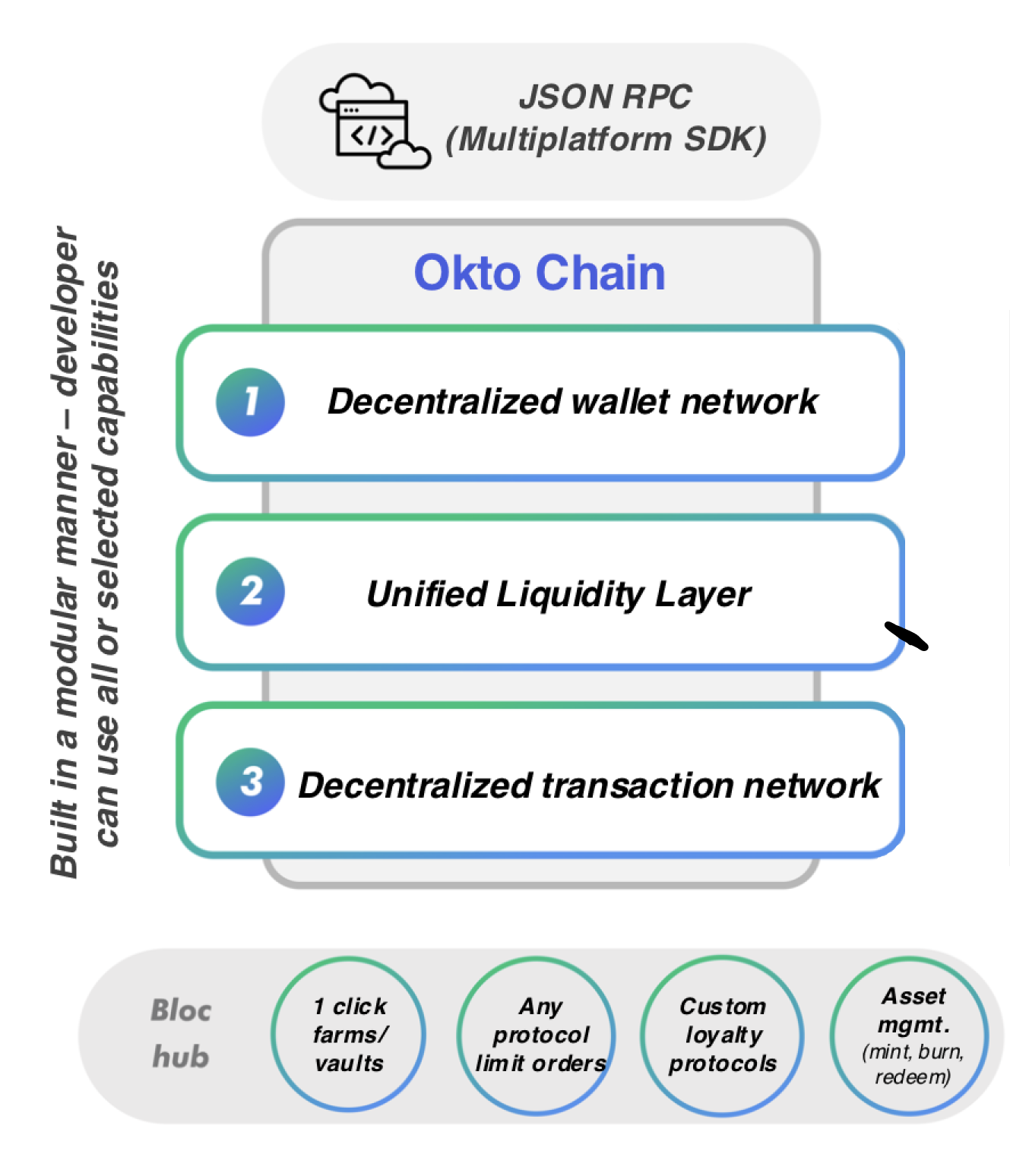Okto Chain
The Okto Chain is a specialized, utility-focused Layer-2 blockchain built using the Polygon Chain Development Kit (CDK). It serves as the central coordination and verification platform for the Okto ecosystem.
Unlike general-purpose blockchains, the Okto Chain is specifically designed to manage and orchestrate cross-chain operations, ensuring transparency, security, and efficiency within the Okto Platform.
By serving as the “glue” that binds together the Decentralized Wallet Network (DWN), Decentralized Transaction Network (DTN), and Unified Liquidity Layer (ULL), the Okto Chain enables end‐to‐end cross-chain operations with verifiable, on-chain commitments.

Core Functionality
The primary function of the Okto Chain is to provide an immutable and auditable ledger for all activities within the Okto ecosystem. It acts as the "command center" for the DWN, ULL, and DTN, facilitating trustless interactions between these components.
Key functionalities include:
-
Intent and Job Management: The Okto Chain records user-initiated intents for cross-chain actions. These intents are broken down into granular "jobs," each tracked and managed on-chain, ensuring a complete and verifiable history of user requests.
-
Policy Enforcement: The Okto Chain enforces predefined policies governing user permissions, client restrictions, and interactions between Okto components. This ensures that all operations within the ecosystem adhere to security and compliance parameters.
-
Event-Driven Orchestration: Publishes on-chain events (e.g., “job created,” “job assigned,” “job terminated”) to signal downstream components—particularly DTN—that further action is required.
Architecture and Technology
-
Layer-2 Rollup on Polygon CDK: Built as a ZK-based rollup, inheriting security from Ethereum and leveraging Polygon CDK for efficient development and deployment.
-
Proof-of-Stake (PoS) Consensus: Utilizes a Proof-of-Stake consensus mechanism for network security and data availability guarantees.
-
Specialized Utility Chain: Optimized for coordination and verification tasks, not designed for general-purpose computation or DeFi activities.
-
Job Manager: Registers new jobs, updates their statuses, assigns DTN nodes, and logs final states.
Core Smart Contracts
The Okto Chain's capabilities are brought to life through specialized smart contracts:
Entry Point (ERC-4337)
The central entry point for all User Operations (UserOps):
- UserOp Validation: Ensures all operations meet security requirements
- Signature Verification: Validates cryptographic signatures from DWN
- Policy Checks: Enforces user and client-specific policies
- Gas Sponsorship: Manages Paymaster interactions for gasless transactions
User Account & Client Account
Implementation and Factory contracts for smart contract wallets:
- Account Deployment: Creates new smart contract wallets for users and clients
- Proxy Architecture: Allows for upgradability and flexible account logic
- Permission Management: Controls access and authorization for different operations
Job Manager
Central coordination for intent execution:
- Job Initiation: Creates new jobs from user intents
- DTN Assignment: Coordinates which DTN node handles specific jobs
- Status Tracking: Monitors job progress and completion
- Event Emission: Triggers downstream processing through strategic events
Intent Registry & Intents
Registry of executable scripts for different intent types:
- Intent Definitions: Smart contracts representing different operation types
- Parameter Validation: Ensures intents meet required criteria
- Execution Logic: Defines how different types of cross-chain operations should be handled
- Off-Chain Components: Coordinates with external systems when necessary
Policy Manager
Stores and enforces policies at multiple levels:
- User-Level Policies: Individual spending limits and restrictions
- Client-Level Policies: Application-specific rules and controls
- Wallet-Provider-Level Policies: Global security and compliance requirements
- Dynamic Updates: Allows policy modifications while maintaining security
Paymaster
Enables gasless transactions through sponsored fees:
- Client Deposits: Manages funds deposited by applications for gas sponsorship
- Signer Registration: Coordinates authorized Paymaster usage
- Fee Management: Handles gas fee calculations and payments
- Usage Tracking: Monitors sponsored transaction volumes and costs
Benefits
For Users
- Transparent Operations: Complete visibility into all cross-chain activities
- Guaranteed Execution: Immutable record ensures promised operations complete
- Policy Protection: Automated enforcement of spending limits and security rules
For Developers
- Reliable Coordination: Trustless infrastructure for complex multi-chain applications
- Event-Driven Integration: Simple integration through standardized event patterns
- Flexible Policies: Programmable rules for application-specific requirements
For the Ecosystem
- Interoperability: Standardized coordination enables broader ecosystem integration
- Security: Robust verification and audit trails for all operations
- Scalability: Efficient rollup architecture supports high transaction volumes
Getting Started
The Okto Chain is live on testnet and ready for development:
- Testnet Explorer →: Explore the Okto Chain testnet
- Developer Dashboard →: Configure your application
- Integration Guides →: Start building with Okto SDKs
- Policy Documentation →: Learn about policy configuration